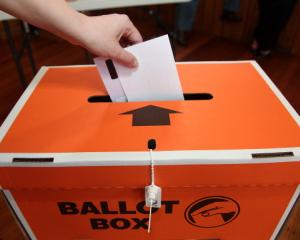How many more blows can Dunedin Hospital and the Southern District Health Board - already on their knees - possibly sustain?
The latest news - that the commissioner-run board has failed a Medical Council accreditation inspection to train house officers (or interns) - comes as a shock.
The June sacking of the board and appointment of a commissioner team was the low point for the institution, but, despite ongoing uncertainty about the clinical services rebuild and the Government's overall plan for hospital services in the South, there has at least been a feeling the commissioners might be making some progress.
(The release of their work plan at the start of the month - while four months in the making and light on detail - was greeted positively by unions and staff, for example.)
To receive yet another knock-back is serious.
While Southland Hospital was praised for parts of its intern training, Dunedin Hospital was highly criticised.
In the absence of a chief medical officer (the position has been vacant since June), no-one had taken (or delegated) responsibility for house officer training, interns reportedly had a huge workload, and procedures were found wanting.
As training accreditation is through DHBs as a whole, Southland Hospital has suffered as a result of Dunedin's failings.
It would be desirable to view the accreditation failure as something of a ''blip'' and feel reassured, as the Medical Council has stated, that both hospitals are safe for training on an interim basis (until mid-May 2016) and that patient safety has not been compromised, and, as acting CMO Richard Bunton has said, that the required changes have or are being implemented, and the criticisms are about method, not quality.
But it is impossible to ignore the council's concerns and comments (such as standards need ''to be greatly improved'' and ''a significant number'' of actions undertaken to do so) or to view the training accreditation failure in isolation.
After all, it comes on the heels of similar situations regarding intensive care and orthopaedic training.
Once again, familiar criticisms regarding accountability, leadership, engagement, culture, commitment, planning and procedures are highlighted.
It seems incredible that many people's experience at Dunedin Hospital remains positive.
Letters to this newspaper frequently praise the quality of service.
People seem remarkably understanding, and are aware those at the coalface are committed to patients and to providing quality care despite working in challenging circumstances.
But if the management, systems and some practices are questionable, can patient safety be guaranteed?
As the hospital lurches from one public relations disaster to the next, there is a very real impact on public perception.
The effect on medical trainees and staff can only be imagined. There have already been claims people will choose to study elsewhere.
Are staff seeking employment elsewhere, too? And what message does such continued instability send to national policymakers and powerbrokers?
Certainly the Medical Council's comment in its report that ''of particular concern is that we have no evidence that [house officer training] is seen as a priority at a senior leadership or governance level'' seems completely at odds with the one civic leaders like to trumpet our teaching, the vital relationship between the hospital and the University of Otago, and their importance to the city's economy and status.
There is no doubt the commissioners face a mammoth task fixing years of issues.
But further erosion of proudly held training standards will only play into the Government's hands if indeed - as many fear - its agenda is to reduce the size and services of Dunedin Hospital.
There cannot be complacency from the commissioners or senior staff and management.
The public must see some ''vital signs'' soon, to restore credibility, trust and hope - all of which remain in short supply.












